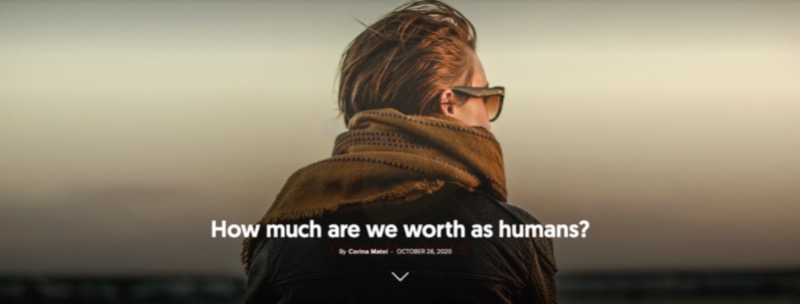The great attraction of the virtual world comes from the fact that it gives its users the possibility of escape. Inside that world, they feel they can hide their identity and satisfy their every fantasy without suffering any consequences. Being able to hide one’s identity offers a sense of freedom, which isn’t a bad thing to want, after all. But is freedom of action without any restrictions possible?
Good or bad?
Essentially, throughout history, theorists of human nature have contributed to two perspectives of interest to the subject of this article: perfectionist and antithetical. The perfectionist perspective on human nature states that mankind is inherently good, but the environment is unfavourable. The antithetical perspective states that the individual is inherently corrupt and therefore needs certain restrictions in order to act properly. Are people inherently good or bad? Which is the truth?
If mankind is good by nature, then how is it that, throughout human history, evil has been more present than good (wars, exploitation of fellow human beings, etc.)? The Bible offers a fairly broad and credible perspective on human nature and, at the same time, a detailed description of the process of its moral degradation. The book of Genesis shows how evil entered our world through man’s choice. According to the Bible, from that moment on, mankind’s first impulse was toward evil.
Later, King David said in Psalm 51:5: “Surely I was sinful at birth, sinful from the time my mother conceived me.” In the Gospels, Jesus Christ declared that mankind is fundamentally sinful: “If you, then, though you are evil…” (Matthew 7:11). When he wrote these words, the apostle Paul emphasised that mankind is inclined to evil: “For we have already made the charge that Jews and Gentiles alike are all under the power of sin. As it is written: ‘There is no one righteous, not even one; there is no one who understands; there is no one who seeks God. All have turned away, they have together become worthless; there is no one who does good, not even one’ … For all have sinned and fall short of the glory of God (Romans 3:9-12,23).
The apostle John is also categorical about the sinful nature of humanity: “If we claim to be without sin, we deceive ourselves and the truth is not in us. […] If we claim we have not sinned, we make him out to be a liar and his word is not in us” (1 John 1:8,10). Therefore, the entire Bible reinforces the idea that there is no human being who can claim to be untouched by sin.
If human nature is fundamentally sinful, then in every person there is the potentiality to any form of evil (both in type and degree). This fact should make every human being aware of their inclination or propensity to commit evil in an environment that would favour it. Circumstances only trigger the manifestation or resonate with the evil existing in the human being. Mankind has the inclination, the predisposition, and the impulse towards evil. This fact poses a risk to the very idea of community and society.
You might also be interested in reading:
Re-education, submission…
How can human society exist and sustain itself considering that we are all fundamentally evil? The need for rules or laws by which human relations can be regulated is obvious, and God gave the newly created people a law of obedience immediately after creation. The law of obedience was represented by the prohibition to eat from the tree of the knowledge of good and evil, a commandment that tested the willingness of the first family to obey God. It was a test of maturity, the establishment of which demonstrates the need for order and discipline, necessary even in a world where sin did not yet exist. The freedom of choice of the newly created being also implied the potential to choose evil, which is exactly what happened.
…or rebirth?
If this was the case before the first humans fell into sin, the situation is even more significant now that mankind’s nature has fallen and people have evil inclinations and tendencies. In their current state, humans do not need to cultivate evil in order to do it. According to the Bible, evil is not just an unsuitable environment into which we are born. Evil is part of our innate nature. It is part of our genetic code.
If immediately after their creation humans could choose for themselves between evil or good, in the present state, they cannot help but do evil. It takes power outside of human nature to help people choose the good. In His discussion with Nicodemus, one of the members of the Sanhedrin, Jesus Christ distinguishes between moral life and spiritual life. As far as soteriology is concerned, morality is not enough; something else is needed. “Very truly I tell you, no one can see the kingdom of God unless they are born again” (John 3:3).
The rebirth that Jesus Christ speaks of is nothing but the process of restoring the human being, which begins with the redemptive death of Jesus. The wages of sin is death, but Christ has taken our place. The Bible does not neglect to present the stages of the process of effective transformation of the human being: (1) Liberation from the guilt of sin (the stage of forgiveness of the guilt of sin); (2) Liberation from the power of sin (the stage of sanctification/effective transformation); and (3) Liberation from the nature of sin (the stage of glorification, the moment of the return of Jesus Christ, when God changes the nature of mankind).
Nevertheless, all that God does for human beings in the process of restoration does not invalidate the role of His Law. The Sermon on the Mount is not an annulment of the Law, but a reaffirmation, rehabilitation, and unearthing of its meanings that have been lost over the centuries. The rule offered by Jesus, “So in everything, do to others what you would have them do to you, for this sums up the Law and the Prophets” (Matthew 7:12), does not represent a utopian ideal, but is a desideratum that aims to establish order in individual and social life. People can follow this rule by imposing self-restraint, so that their freedom does not negatively affect others’.
Speaking about the time of the end of history, Revelation emphasises the existence of the people of God, who “keep his commands and remain faithful to Jesus” (Revelation 14:12). The Law of God is not only a stage in the process of rehabilitation of the human being. To humanity and the universe, it is the very foundation of God’s government.




















